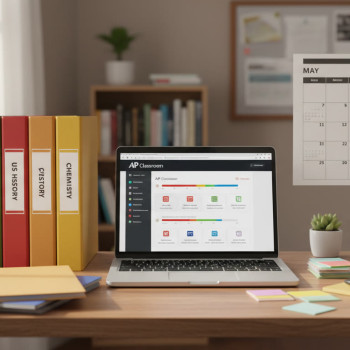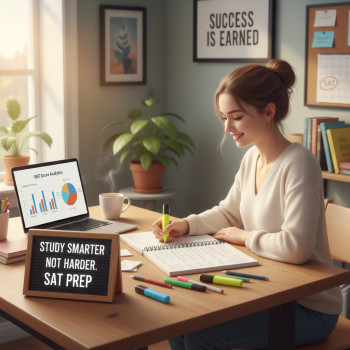AP vs SAT: Why the Night-Before and Test-Week Matter
There s a particular hush that falls over families during test week a low hum of flashcards, the soft glow of a laptop at 11 p.m., and the steady concern parents show over whether their student ate breakfast that morning. But not all tests are the same. The way you prepare for the Digital SAT and an AP exam in the final days and the night before differs meaningfully. This guide walks you through practical, research-informed, and deeply human strategies you can actually use: checklists, schedules, what to pack, and how to manage stress. If you ve ever wondered whether to cram one more chapter at midnight or to turn off your phone, you ll find clear answers here for both students and the adults who want to help them succeed.
Quick headline differences (so you know what s coming)
- AP exams are subject-specific and test deeper knowledge and skills in a course (often taught over a year). The final-day prep is often more focused on writing practice, free-response skills, and reviewing specific content themes.
- The Digital SAT is a broader college-readiness test: reading, writing and language, and math. Test-week prep tends to emphasize timing, adaptive test experience practice, and strategy for multiple-choice and grid-in style questions.
- Logistics differ: many AP exams are now digital and administered in school with proctors and a Bluebook app, while the Digital SAT may be taken at authorized test centers or in certain school administrations and requires familiarity with digital testing tools and device setup.

Test-Week Mindset: What to Prioritize
Test week is not a free-for-all cram-fest. It s a final, focused sprint that should balance review with rest. Your objective is not to learn brand-new, heavy material at the last minute but to solidify what you already know, practice test mechanics, and arrive mentally and physically ready.
AP Exam Week Priorities
- Targeted Content Review: Focus on the major units and themes that most frequently appear in free-response and multiple-choice sections for your specific AP course.
- Free-Response Practice: Time yourself on actual released FRQs and practice planning and outlining responses under timed conditions.
- Command of Rubrics: Understand scoring rubrics what graders look for so your responses include the right elements.
- Bluebook Familiarity (digital AP): Practice using the testing app to annotate passages, upload responses, and navigate the interface.
Digital SAT Test-Week Priorities
- Timing and Pacing: Take at least two full-length, timed practice tests in the Bluebook environment (or the College Board s official platform) to simulate the real pacing and adaptive sections.
- High-Yield Review: Target vocabulary-in-context strategies, grammar rules for Writing & Language, and core math problem types (algebra, problem solving, data analysis).
- Test-Taking Strategies: Practice process-of-elimination, educated guessing, and how to skip and return to items efficiently on a digital interface.
- Device & Tech Practice: Ensure comfort with digital calculators (if allowed), built-in tools, and how to flag or mark questions on-screen.
Night-Before Rituals: AP vs SAT
Night-before rituals are where confidence is built. While the academic content you might review differs, the physical and mental preparation has much in common. The goal: get quality sleep, firm up your plan for logistics, and give your brain safe, gentle signals that you ve done the work.
AP Night-Before Checklist
- Do a light content review (45 60 minutes): skim outlines, go over a few sample FRQs, and review the scoring rubric to remind yourself what graders reward.
- Practice one short timed writing (if your AP is writing-heavy): 15 30 minutes to run through structure and transitions, not to cram facts.
- Pack your bag: any approved reference sheets, pencils, allowed calculators, photo ID, water bottle, and printed notes if your school allows it. If the exam is digital, ensure you have any device-specific requirements handled through your school coordinator.
- Technical check (if applicable): confirm your testing room, proctor instructions, and that the Bluebook app is installed and signed in on practice devices. Let your school tech lead handle administrative set-ups don t attempt last-minute installs on exam day.
- Set alarms and layout clothes: minimize morning decision fatigue.
- Turn off heavy study: 60 90 minutes before bed, switch from intense study to something soothing light review, music, or a warm shower.
Digital SAT Night-Before Checklist
- Full practice test earlier in the week: if possible, take a proctored or timed practice test 2 3 days before test day rather than the night before.
- Do a brief review session (30 45 minutes): review common trap questions, quick math formulas, and one passage reading strategy.
- Confirm logistics: test center location or digital check-in instructions, permitted ID, and testing window time. Print or screenshot confirmation details.
- Device & charger: If you re permitted to bring a device, pack chargers and extras. If testing center supplies devices, ensure you know what they provide and whether you must bring your own.
- Mental wind-down: 45 60 minutes of relaxation practice deep breathing, a mindfulness app, or calm stretching. Avoid all-night problem-solving or heavy memorization.
Morning-Of: Routines That Help You Thrive
Test mornings reward simple, predictable routines. Panic is contagious; calm is too. Parents and students can plan a morning that minimizes surprises and maximizes focus.
Shared Morning Rules for Both Tests
- Eat a balanced breakfast: protein, whole grains, and fruit stabilize blood sugar and attention (eggs + toast, yogurt + granola, peanut butter on whole-grain bagel).
- Hydrate: bring a water bottle if allowed. Small sips help with concentration; avoid excessive caffeine.
- Arrive early: give yourself extra time for traffic, check-in, and a calm moment before the session begins.
- Bring necessary materials and ID: double-check the test day room assignment and what is permitted in the testing room.
- Mental cue: choose a short mantra or breathing routine that grounds you 3 deep breaths, focus on your first question, or quietly recite a calming phrase.
Specific Morning Tips for AP Exams
- Bring any subject-specific tools allowed (approved calculators for some AP math/science exams) and any permitted formula sheets provided by your teacher or exam guidelines.
- Quick warm-up: if your exam includes essay writing, spend 5 10 minutes outlining a mock thesis for a common topic just to get your argumentative muscles moving.
- Classroom logistics: remember AP exams are typically administered within your school; be ready to follow proctor instructions about device usage, bluebook sign-in, and time limits.
Specific Morning Tips for the Digital SAT
- Know the adaptive structure: be ready for the Digital SAT s adaptive format where pacing strategies differ across modules this helps with mental planning for which sections to prioritize time on.
- Calculator rules: confirm whether calculators are permitted for certain math modules and practice using the allowed on-screen calculator beforehand so you don t lose time figuring it out mid-test.
- Tech checks: if you are taking the digital SAT on your own device (rare in official centers), verify that your device is fully charged, that the testing environment is quiet, and that you can access the secure test app.
What to Study and What to Avoid the Night Before
Last-minute review is effective when targeted. The worst thing you can do is try to learn complex new topics late at night. Instead, practice the skills that amplify your performance and strengthen confidence.
Do
- Review formulas, vocabulary lists, and quick reference sheets items you can commit to memory in short bursts.
- Scan practice questions and review solutions to questions you already missed in practice tests understand the mistake pattern.
- Do one timed practice passage or a short writing prompt to keep your brain in test mode without draining it.
Don t
- Don t attempt brand-new topics or deep dives into complex concepts you ve never studied; this causes confusion and anxiety.
- Don t binge practice tests late into the night. Fatigue impairs recall and reasoning, especially on timed sections.
- Don t compare yourself to others on social media or swap anxiety-inducing exam rumors; trust verified guidance from your teacher or testing coordinator.
Practical Checklists: Pack, Plan, and Power Through
Whether you re a student or a parent, having clear, tangible checklists reduces stress and prevents forgetfulness. Here are checklists tailored to each exam type.
AP Exam Day Pack List
- Government-issued photo ID or school ID (as required)
- Number 2 pencils with erasers and a good pen for essay portions
- Approved calculator (if allowed for the subject)
- Water bottle and snack for after the exam
- Any permitted formula sheets or reference materials
- Printed exam admission ticket or screenshot of testing confirmation (if applicable)
Digital SAT Day Pack List
- Acceptable photo ID (passport, driver s license, or as indicated on your admission ticket)
- Fully charged allowed device or know what the center provides
- Calculator (if allowed) and charger/backup batteries
- Snack and water for breaks
- Admission ticket confirmation and test center directions
One Table to Compare Night-Before/Test-Week Differences
| Category | AP Exams | Digital SAT |
|---|---|---|
| Primary Focus During Test Week | Depth of subject knowledge, free-response practice, rubric alignment | Timing, pacing, multiple-choice strategies, adaptive section practice |
| Best Final-Day Study | Short FRQ outlines, key concept summaries, formula and chronology review | Short timed sections, quick math formula review, reading strategy refresh |
| Logistics to Confirm | Proctor rules, Bluebook app readiness, room assignment | Test center or digital check-in, device rules, allowed calculator use |
| Night-Before Strategy | Light content review, outline practice, sleep hygiene | Brief practice, pacing review, tech and ID check, sleep hygiene |
| Stress-Reduction Techniques | Timed practice with calming breathing before essay writing | Mock adaptive practice and focus on one passage at a time with breathing breaks |
How Parents Can Help Without Hovering
Parents play an enormous role in test-week success. The most helpful presence is calm, practical, and supportive not micromanaging. Here s how to be that steady anchor.
- Build routines: encourage consistent bedtimes and healthy meals during the week.
- Provide logistics support: drive to the test center, confirm check-in times, or ensure materials are packed.
- Offer emotional support: ask how you can help, listen, and avoid high-pressure pep talks that raise stress.
- Create a recovery plan: plan a small celebration after the exam pizza, a walk, or a movie to mark the milestone.
Real-World Examples: Two Students, Two Approaches
Stories help make strategies practical. Here are two brief, anonymized examples that show how different approaches work.
Marisol AP Biology Student
Marisol spent the week before her AP Biology exam organizing concept maps for the big units cells, genetics, ecology. She used AP Classroom to run through released FRQs and practiced writing one free-response answer per evening. The night before, she did a light review of cellular processes, packed her permitted calculator and pencils, and set three alarms. Her teacher reminded the class to download an exam preview on the Bluebook app, but the school tech team handled final installs. Marisol slept 8 hours and used a calm breathing routine in the morning. She reported that the rubric-focused writing practice made her feel less overwhelmed by the long-form questions.
Ethan Digital SAT Taker
Ethan s test-week routine emphasized pacing. He took a full-length Digital SAT practice two days earlier, then spent a night reviewing timing strategies for each module. The night before, instead of cramming formulas, he reviewed a cheat sheet of algebraic manipulations and a few common grammar rules. He practiced using the digital calculator and toggling between questions on the practice app to remove the novelty on test day. Arriving early allowed him to settle in. Afterwards he said the test felt like a collection of short tasks rather than one overwhelming marathon because he had rehearsed the pacing ahead of time.
Stress Management and Sleep Science What Actually Helps
When it comes to performance, sleep beats late-night studying more often than not. Consolidation of memory happens during sleep, so losing those hours for last-minute review is usually counterproductive. Aim for consistent sleep in the days leading up to the exam and a reasonable bedtime on the night before. If anxiety keeps you awake, try these simple practices:
- Box breathing: inhale 4 seconds, hold 4, exhale 4, hold 4. Repeat 4 times.
- Progressive muscle relaxation: tense and release each muscle group from toes to head.
- Brief guided meditation or imagery: visualize walking into the exam room with calm confidence and sitting down to the first question.
How Personalized Tutoring Can Make the Final Week Smoother
Personalized support can convert scattered study into efficient, confidence-building work. That s where focused, 1-on-1 guidance shines in test-week planning.
- Tailored study plans: a tutor can identify the highest-impact topics to review in the final days and build a realistic night-before checklist.
- Targeted practice: tutors provide selective practice sets that mirror the most test-relevant skills quick, targeted, and morale-boosting.
- Exam-tech coaching: for digital testing, a tutor can ensure students are comfortable with the Bluebook environment and digital test mechanics.
- Emotional support and accountability: having an experienced guide helps calm anxiety and provides strategy reminders the night before the test.
For families wondering where to get that help, Sparkl s personalized tutoring offers 1-on-1 guidance, tailored study plans, expert tutors, and AI-driven insights to pinpoint what to practice in the final week so students spend time on what matters most, not what feels urgent.
Common Pitfalls and How to Avoid Them
- Overstudy fatigue: Stop heavy review at least an hour before bed; switch to passive review like flashcards or calming reading.
- Technical panics: Don t leave app installs or device checks to the last minute coordinate with your school or testing center well in advance.
- All-or-nothing mentality: One test doesn t define you. Use practical milestones (complete a timed passage; outline one FRQ) instead of trying to perfect everything.
- Poor nutrition/hydration: Test anxiety and poor performance often trace back to skipped meals or dehydration pack a modest snack and water where allowed.
Final Hour Rituals: Gentle Habits That Protect Performance
In the last hour before testing, do a quick, predictable set of habits that bring your brain to the right state:
- Check materials and ID once more.
- Do 3 5 minutes of breathing or a short walk to reduce adrenaline.
- Remind yourself of one actionable strategy for the first section e.g., read the questions first for a reading passage or skim the whole math problem before picking a strategy.
After the Exam: Recovery and Next Steps
Whether you celebrate or reflect, plan something restorative after the test. Don t immediately replay the exam or scour forums for leaked questions those behaviors spike anxiety and don t change your score. Instead:
- Eat and rest. Your brain has been running at high intensity and needs recovery.
- Do a debrief the next day: list 2 things that went well and 2 things to tweak for future tests. This creates a growth mindset and reduces catastrophic thinking.
- If you plan to retake the Digital SAT or a different AP exam, use official score reports and targeted tutoring to build a plan. A tutor can turn your post-exam notes into an efficient study strategy.
Parting Thought: Confidence Is a Practice
In the end, the night-before and test-week routines are not magic; they re muscle memory. These rituals packed bag, practiced pacing, targeted review, good sleep create a predictable environment where your knowledge can show up. Whether it s the depth-focused AP exam or the pacing-driven Digital SAT, the same principles apply: practice deliberately, prioritize rest, and manage logistics ahead of time so you can concentrate on the work in front of you.
And remember: support is available. Personalized tutoring like the 1-on-1 guidance, tailored study plans, and AI-driven insights offered by Sparkl can make those last days less chaotic and more smartly focused. The right help gives students not just knowledge, but the habits and confidence to perform on the day that matters.

Ready to Plan Your Next Test Week?
Use the checklists above, pick one calming night-before routine, and practice it once or twice before the real exam. Small routines compound into steady confidence. If you want a study plan tailored to your student s strengths and the exact timing of their exams, consider reaching out for personalized tutoring because the right plan in the right week often makes the biggest difference.
Good luck. You ve prepared for this moment more than you realize now give yourself permission to show up steady, do your best, and breathe.















No Comments
Leave a comment Cancel